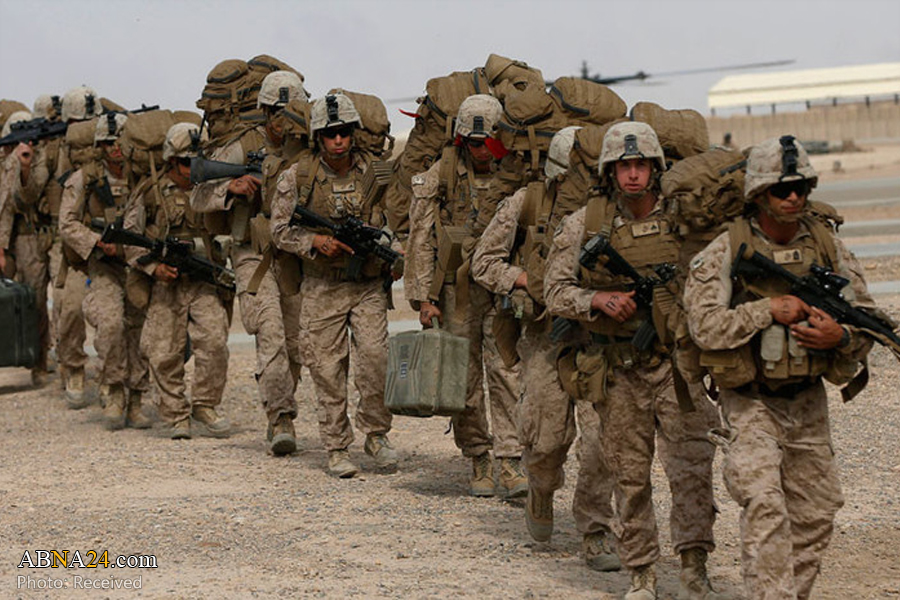AhlulBayt News Agency (ABNA): The US military has offered senior Iraqi security officials plans for a partial withdrawal of troops from Iraq, reneging on an earlier promise to leave the Arab country, online news website Middle East Eye (MEE) reports.
It cited unnamed sources as saying that a meeting was held in great secrecy between the two sides in the private residence of the Canadian ambassador to Jordan in Amman last week.
A representative of the US military told the Iraqis that Washington was prepared to leave positions in or near Shia-majority areas, such as Balad airbase which houses US personnel about 80 kilometers north of Baghdad.
The Iraqis were told that Washington could even consider reducing its troops in the capital Baghdad, the report said.
However, the US side categorically dismissed withdrawing from Ain al-Asad, the biggest US airbase in Anbar province.
“We cannot even start talking about withdrawing [from Ain al-Asad]. Withdrawal is out of the question,” the US representative said.
Ain al-Asad airbase came under missile fire from Iran last month, in response to the US assassination of top Iranian commander Gen. Qassem Soleimani, and the second-in-command of Iraq's Popular Mobilization Units (PMU) Abu Mahdi al-Muhandis at Baghdad international airport on January 3.
About 5,300 American forces are deployed across Iraq. Two days after the assassination, the Iraqi parliament approved a motion, calling for the withdrawal of all American forces.
Later on January 9, former Iraqi prime minister Adel Abdul-Mahdi called on the United States to dispatch a delegation to Baghdad tasked with formulating a mechanism for the move.
According to a statement released by the Iraqi premier’s office, Abdul-Mahdi “requested that delegates be sent to Iraq to set the mechanisms to implement the parliament's decision for the secure withdrawal of (foreign) forces from Iraq” in a phone call with US Secretary of State Mike Pompeo.
He said that Iraq rejected violation of its sovereignty, particularly the US military's violation of Iraqi airspace in the assassination. The US State Department bluntly rejected the request the following day.
Angered by the Iraqi parliament's vote on January 5, US President Donald Trump threatened the Iraqis with "sanctions like they've never seen before" if American troops were asked to leave.
On January 10, he suggested blocking some $35 billion of Iraqi money "right now sitting in an account" in the United States.
Last week, Iraq’s two leading Shia parliamentary coalitions of Sairoon (Marching Towards Reform) and al-Fatah (Conquest) renewed their calls for the withdrawal of American forces from the Arab country.
Calls have grown in Iraq for the US withdrawal since last December, when Trump made an unannounced visit to Ein al-Asad airbase.
The trip sparked a wave of condemnations from Iraqi political leaders, with some of them demanding a swift expulsion of American forces.
Recently, Trump ordered to withdraw all American troops from Syria and half of them from Afghanistan, but said he had no similar plans for Iraq.
The US, backed by the UK, invaded Iraq in 2003 claiming that the former regime of Saddam Hussein possessed weapons of mass destruction.
No such weapons, however, were ever found, and the invaders withdrew from Iraq, after nearly nine years of a military campaign that cost tens of thousands of Iraqi lives.
Leading a new coalition of its allies, the US returned to Iraq in 2014, when the Daesh terror group unleashed a campaign of destruction in the Arab country. Many reports, however, said US operations largely spared the terrorists and led, instead, to civilian deaths and inflicted damage on Iraqi infrastructure.
Iraq’s armed forces, backed by mainly Shia volunteer forces, subsequently managed to liberate all Daesh-held areas thanks to military advisory assistance from neighboring Iran.
Baghdad declared the end of the anti-Daesh campaign in late 2017.
..........................................
End/ 257
source : Press TV
Sunday
16 February 2020
12:38:58 PM
1010799
US military rejects Iraqi demand, offers partial withdrawal: Report

The US military has offered senior Iraqi security officials plans for a partial withdrawal of troops from Iraq, reneging on an earlier promise to leave the Arab country, online news website Middle East Eye (MEE) reports.
